|
|
|
Sort Order |
|
|
|
Items / Page
|
|
|
|
|
|
|
| Srl | Item |
| 1 |
ID:
137229
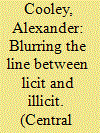

|
|
|
|
|
| Summary/Abstract |
The anti-corruption norm in both scholarship and the policy world has too narrowly focused on the domestic and institutional context of bribe-taking and public corruption. Instead, we argue that corruption in the contemporary global economy requires a multiple set of connected transactions, processes, and relationships that take place within informal transnational networks that blur the line between illegal and legal activities. These networks include multinational companies, elites in host countries, offshore financial vehicles and conduits, middlemen and brokers, and destination financial institutions. We examine how these actors operate in Central Asia, a region that is widely identified as corrupt, yet is rarely understood as embedded in the types of global processes, offshore connections and transnational links specified in our analysis. Examples of offshore centers in tax planning from Central Asia, and partial results from a field experiment based on impersonating high corruption risks from four Central Asian states, provide evidence for how the various actors in transnational financial networks structure their dealings. We then present two brief illustrative cases of how these transnational networks have operated in energy explorations services in Kazakhstan and telecommunications contracts in Uzbekistan. Our findings have theoretical, practical, and normative implications for scholars and practitioners of Central Asian international political economy and other ‘high risk' regions.
|
|
|
|
|
|
|
|
|
|
|
|
|
|
|
|
| 2 |
ID:
164530


|
|
|
|
|
| Summary/Abstract |
This study examines whether completed service in the military reserves results in a civilian labor market benefit. Reservists are not completely absent from the civilian labor market during their military service, possibly allowing them to receive the benefits associated with military experience without forgoing valuable civilian labor market experience. Using a resume study, the results suggest that completed service in the military reserves, relative to no military experience, increases the probability of receiving a request for an interview by 19%.
|
|
|
|
|
|
|
|
|
|
|
|
|
|
|
|
| 3 |
ID:
109960
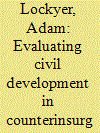

|
|
|
|
|
| Publication |
2012.
|
| Summary/Abstract |
It is a widely held belief that civil development programs play a central role in any counterinsurgency campaign. It is assumed that civil development assistance is key to 'winning the hearts and minds' of the civilian population, which, in turn, is crucial for victory. However, there is currently little evidence to support this belief. This article begins by analysing the different methods that have been used in Afghanistan in order to evaluate the effectiveness of civil development programs since 2001. It finds that these methods have severe limitations. Indeed, based solely upon current methods of evaluation, we have no reliable evidence whether civil development programs are actively improving security, having no impact or making matters worse. As such, this article makes the case for a field experiment approach to be adopted in Afghanistan. It argues that field experiments are the most powerful methodology currently available to social scientists for making causal inferences and, by making minor changes to the way in which civil development is distributed, we can vastly improve our understanding of the relationship between aid and security.
|
|
|
|
|
|
|
|
|
|
|
|
|
|
|
|
| 4 |
ID:
171284
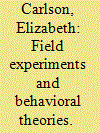

|
|
|
|
|
| Summary/Abstract |
The design of field experiments makes them inappropriate for testing many common political theories. These theories propose that certain factors—for example, income or information—affect how individuals make choices. To test these theories, researchers typically investigate the correlation between the relevant factor and individuals’ choices, holding other factors constant. Field experiments, in contrast, allow multiple factors to vary at once: they create real-world disruption and do not control how actors behave in response. Subjects’ choices will be affected by the experimental treatment as well as by other changes that occur as the larger system reacts. It will be difficult to isolate the effect of any one factor, particularly without a good preexisting model of the system and how it is likely to respond. If a field experiment will not tell us what we need to know, the benefit of the study cannot outweigh harm, and it also will be unethical.
|
|
|
|
|
|
|
|
|
|
|
|
|
|
|
|
| 5 |
ID:
147241
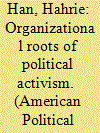

|
|
|
|
|
| Summary/Abstract |
This article examines the role that democratic organizations play in fostering political activism in America. Activists make democracy work by attending meetings, engaging others, trying to make their voice heard, and participating in myriad other ways. Yet, we still need a deeper understanding of what role organizations play in cultivating that activism. The article presents data from three field experiments showing that creating a relational organizational context makes targets more likely to sign petitions, recruit others, and attend meetings. The article argues that civic organizations can have a powerful impact on activism. In doing so, it introduces a new set of variables related to organizational context to consider in understanding the sources of participation. The article thus extends a burgeoning body of experimental research on the social bases of voter turnout by examining not only voting but other forms of activism that are increasingly common modes of citizen involvement in the twenty-first century.
|
|
|
|
|
|
|
|
|
|
|
|
|
|
|
|
| 6 |
ID:
181862
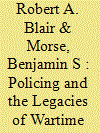

|
|
|
|
|
| Summary/Abstract |
How does violence during civil war shape citizens’ willingness to trust and rely on state security providers in the post-conflict period? Can post-conflict security sector reform restore perceptions of state security forces among victims of wartime state predation? Using a survey and field experiment in Liberia, we show that rebel-perpetrated violence is strongly positively correlated with trust and reliance on the police after conflict is over, while state-perpetrated violence is not. Victims of wartime state predation are, however, more likely to update their priors about the police in response to positive interactions with newly reformed police officers. We also show that abuses committed by police officers in the post-conflict period are negatively correlated with citizens’ perceptions of the police, potentially counteracting the positive effects of security sector reform. We corroborate our quantitative findings with detailed qualitative observations of interactions between civilians and police officers in the field.
|
|
|
|
|
|
|
|
|
|
|
|
|
|
|
|
| 7 |
ID:
188689
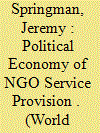

|
|
|
|
|
| Summary/Abstract |
The share of basic services that NGOs deliver has grown dramatically in developing countries due to increased receipt of aid and philanthropy in these countries. Many scholars and practitioners worry that NGOs reduce reliance on government services and, in turn, lower demand for government provision and undermine political engagement. Others argue that NGOs prop-up poorly performing governments that receive undeserved credit for the production, allocation, or welfare effects of NGO services. Using original surveys and a randomized health intervention, implemented in parallel to a similar universal government program, this article investigates the long-term effect of NGO provision on political attitudes and behavior. Access to NGO services increased preferences for NGO, relative to government, provision. However, political engagement and perceptions of government legitimacy were unaffected. Instead, the intervention generated political credit for the incumbent president. This study finds that citizens see NGOs as a resource that powerful government actors control, and they reward actors who they see as responsible for allocation of those resources.
|
|
|
|
|
|
|
|
|
|
|
|
|
|
|
|
| 8 |
ID:
137682


|
|
|
|
|
| Summary/Abstract |
This study uses high-frequency appliance-level electricity consumption data for 124 apartments over 24 months to provide a better understanding of appliance-level electricity consumption behavior. We conduct our analysis in a standardized set of apartments with similar appliances, which allows us to identify behavioral differences in electricity use. The Results show that households' estimations of appliance-level consumption are inaccurate and that they overestimate lighting use by 75% and underestimate plug-load use by 29%. We find that similar households using the same major appliances exhibit substantial variation in appliance-level electricity consumption. For example, households in the 75th percentile of HVAC usage use over four times as much electricity as a user in the 25th percentile. Additionally, we show that behavior accounts for 25–58% of this variation. Lastly, we find that replacing the existing refrigerator with a more energy-efficient model leads to overall energy savings of approximately 11%. This is equivalent to results from behavioral interventions targeting all appliances but might not be as cost effective. Our findings have important implications for behavior-based energy conservation policies.
|
|
|
|
|
|
|
|
|
|
|
|
|
|
|
|
|
|
|
|
|